Unit 10 You're supposed to shake hands.Section B2(2a~2e)课件(共32张PPT)
文档属性
| 名称 | Unit 10 You're supposed to shake hands.Section B2(2a~2e)课件(共32张PPT) | 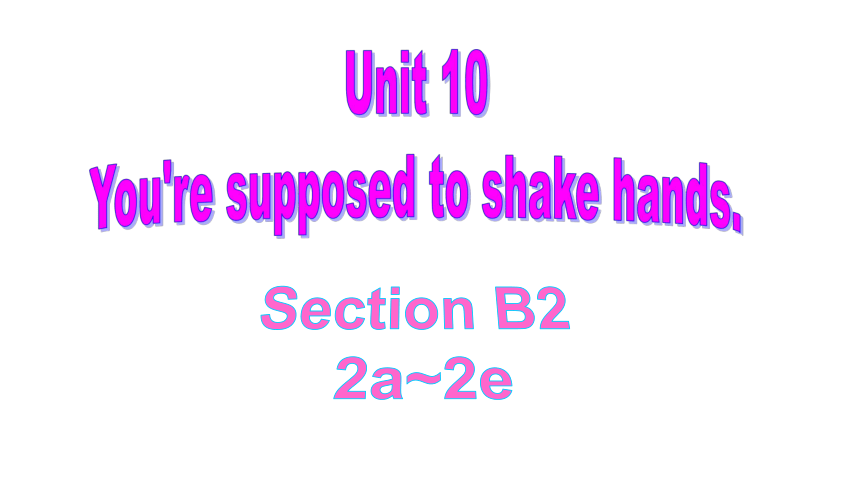 | |
| 格式 | ppt | ||
| 文件大小 | 1009.0KB | ||
| 资源类型 | 教案 | ||
| 版本资源 | 人教新目标(Go for it)版 | ||
| 科目 | 英语 | ||
| 更新时间 | 2022-05-13 17:10:55 | ||
图片预览

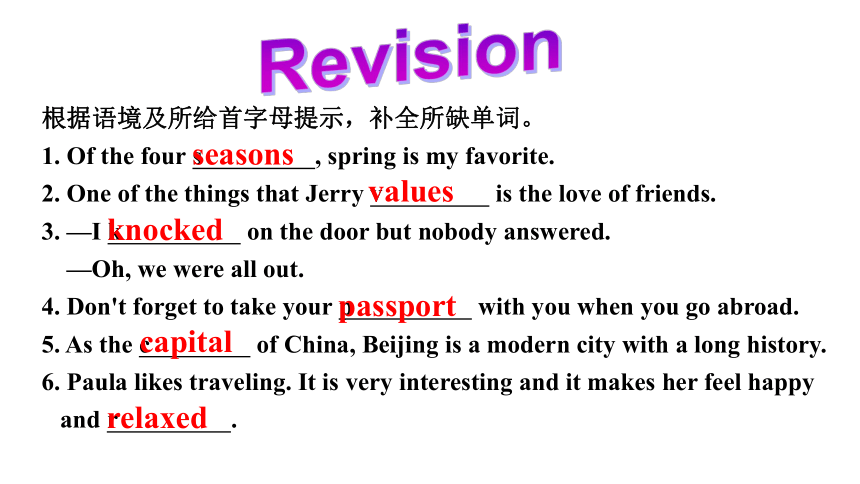

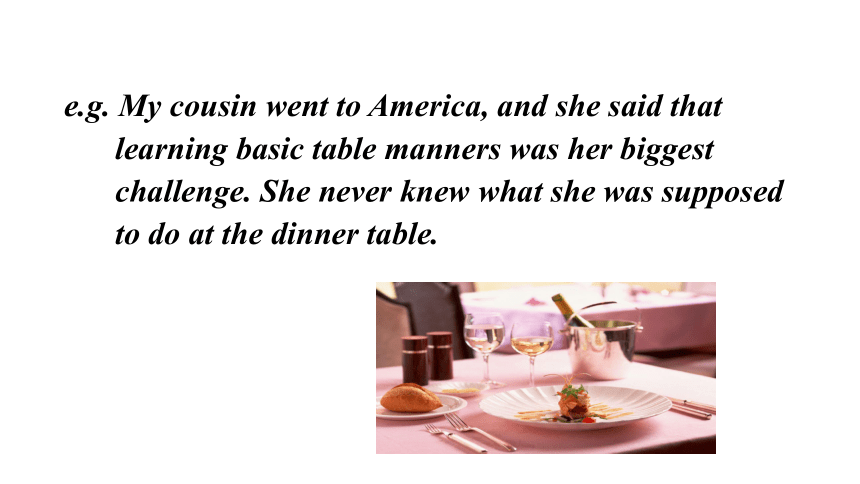
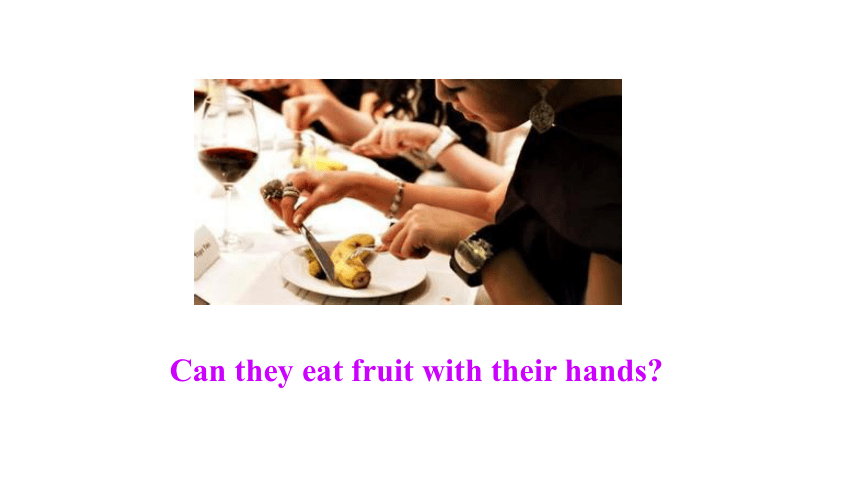
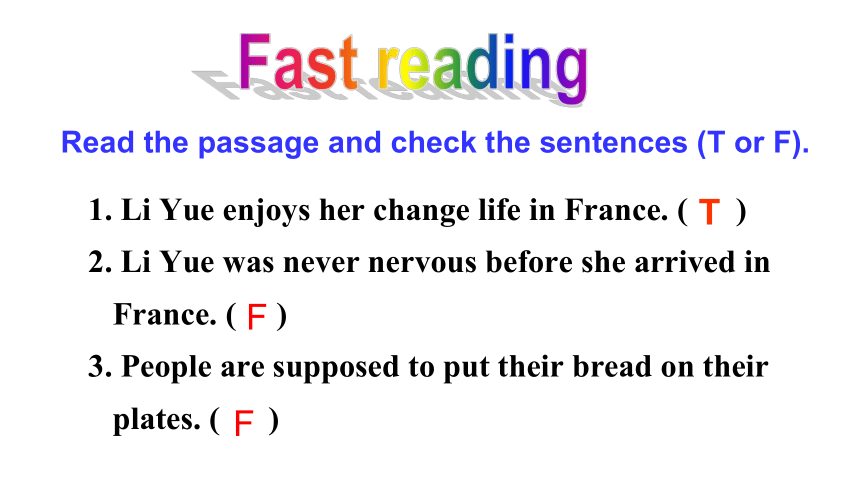
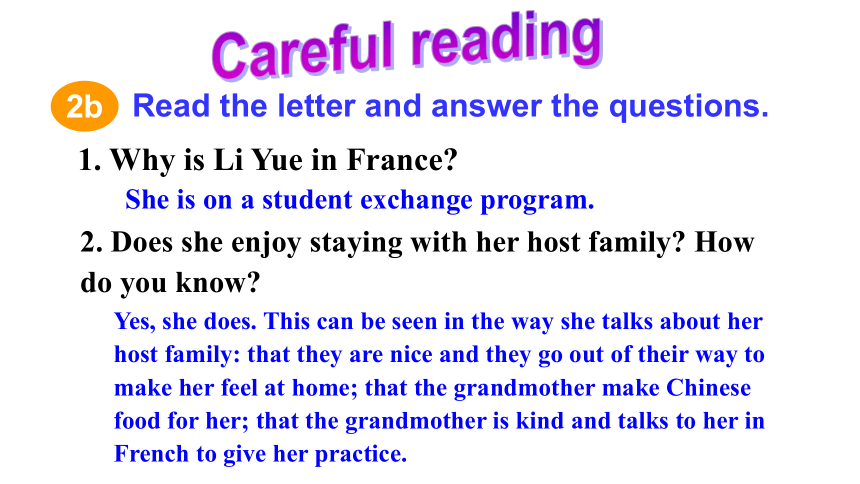
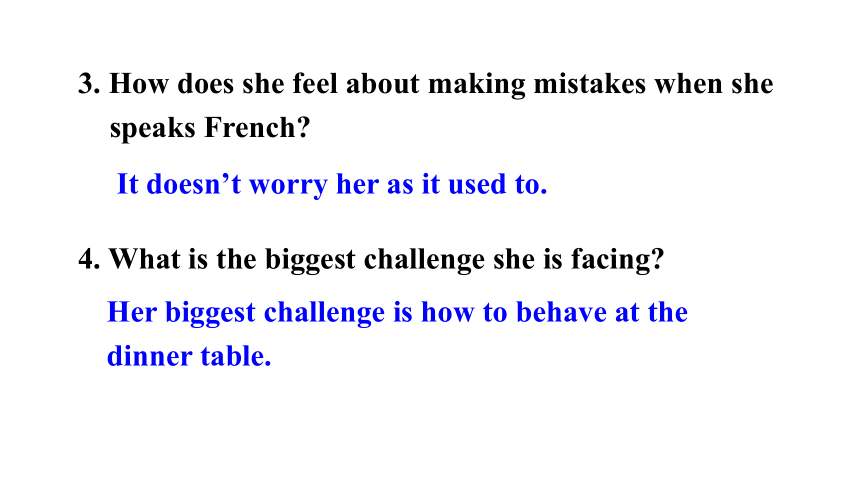

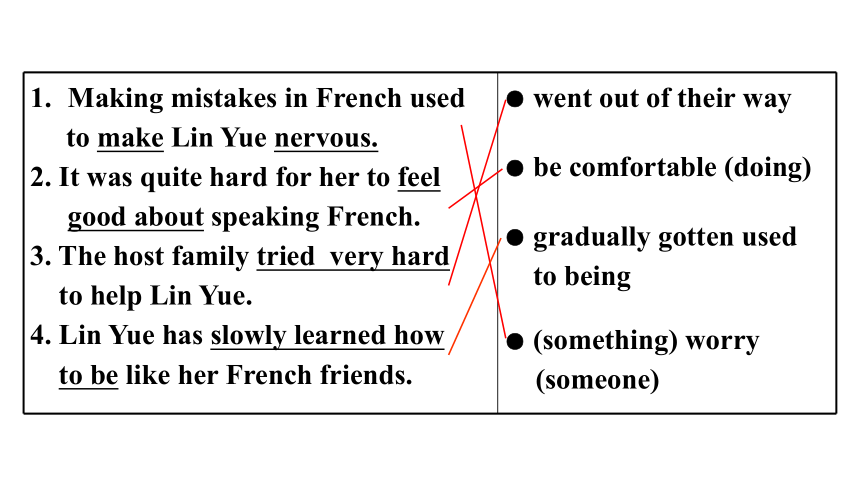
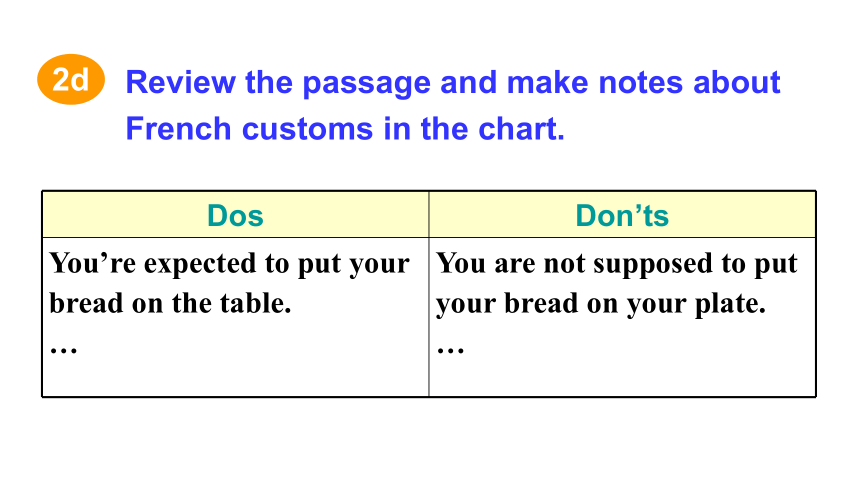
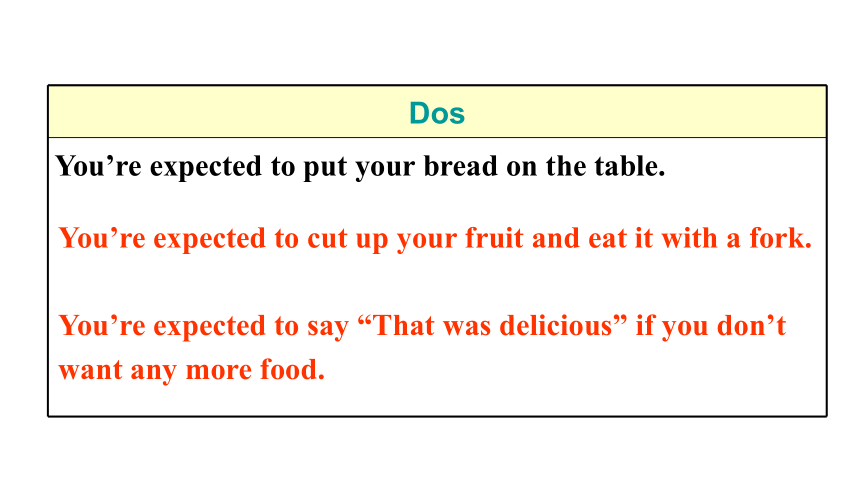
文档简介
(共32张PPT)
根据语境及所给首字母提示,补全所缺单词。
1. Of the four s , spring is my favorite.
2. One of the things that Jerry v is the love of friends.
3. —I k on the door but nobody answered.
—Oh, we were all out.
4. Don't forget to take your p with you when you go abroad.
5. As the c of China, Beijing is a modern city with a long history.
6. Paula likes traveling. It is very interesting and it makes her feel happy
and r .
seasons
relaxed
capital
passport
knocked
values
2a
What do you know about customs in foreign countries What do you think is the biggest challenge when visiting a foreign country
e.g. My cousin went to America, and she said that learning basic table manners was her biggest challenge. She never knew what she was supposed to do at the dinner table.
Can they eat fruit with their hands
1. Li Yue enjoys her change life in France. ( )
2. Li Yue was never nervous before she arrived in France. ( )
3. People are supposed to put their bread on their plates. ( )
Read the passage and check the sentences (T or F).
T
F
F
Read the letter and answer the questions.
2b
1. Why is Li Yue in France
She is on a student exchange program.
2. Does she enjoy staying with her host family How do you know
Yes, she does. This can be seen in the way she talks about her host family: that they are nice and they go out of their way to make her feel at home; that the grandmother make Chinese food for her; that the grandmother is kind and talks to her in French to give her practice.
3. How does she feel about making mistakes when she speaks French
4. What is the biggest challenge she is facing
It doesn’t worry her as it used to.
Her biggest challenge is how to behave at the dinner table.
2c
★ Guess the words you don’t know when you read the passage.
★ Read the sentences and replace the underline words with the phrases in the box.
Making mistakes in French used
to make Lin Yue nervous.
2. It was quite hard for her to feel good about speaking French.
3. The host family tried very hard
to help Lin Yue.
4. Lin Yue has slowly learned how
to be like her French friends. ● went out of their way
● be comfortable (doing)
● gradually gotten used
to being
● (something) worry (someone)
Review the passage and make notes about French customs in the chart.
Dos Don’ts
You’re expected to put your bread on the table.
… You are not supposed to put your bread on your plate.
…
2d
Dos
You’re expected to put your bread on the table.
You’re expected to cut up your fruit and eat it with a fork.
You’re expected to say “That was delicious” if you don’t want any more food.
Don’ts
You are not supposed to put your bread on your plate.
You are not supposed to eat anything with your hands except bread.
You’re not supposed to say you are full.
You are not supposed to put your elbows on the table.
1. Mind your manners!
mind…是一个警示句型,
“注意……; 当心;小心……”。
e.g. Mind your head, please.
请注意你的头。
v. “介意”,常用于否定句和疑问句,后接名词(短语)、代词、动词-ing形式或从句。
单项选择。
1. I don’t _______ the heat, for I’m used to hot weather.
A. like B. mind C. know D. stand
B
2. I wouldn’t mind _____ a roommate. We can help each other and save money as well.
A. having B. to have
C. have D. had
A
2) manners “礼貌;规矩;礼节;礼仪”,此时,manner通常用复数形式。
e.g. 满嘴食物说话是不礼貌的行为。
It’s bad manners to talk with your mouth full.
2. They go out of their way to make me feel at home.
go out of one’s way 特地;格外努力
e.g. John went out of his way to make his girl friend happy.
约翰想方设法使他的女朋友高兴。
make sb. feel at home
使某人感到宾至如归
e.g. 我在尽我一切所能使他们感到宾至 如归。
I’m doing everything I can to make them feel at home.
3. You wouldn’t believe how quickly my French has improved because of that.
常用句式,“你无法想象……;你想都想不到……;你绝不会相信……”,表示所陈述的事情超出想象之外。与此类似的表达还有You would never believe…或You would hardly believe…。
你绝对想不到他在台湾找到了失散多年的姐姐!
You wouldn’t believe that he found his long-lost sister in Taiwan!
你根本无法想象,自从他听了您的讲课后进步有多大。
You would never believe what quick progress he’s made ever since he attended your class.
4. My biggest challenge is learning how to behave at the dinner table.
learning how to behave at the table是现在分词短语,在此用作句子的表语。
e.g. His main hobby is fishing.
他的主要爱好是钓鱼。
The most important thing is getting there in time.
最重要的事是及时到达那里。
behave
不及物动词,“表现;行为”,behave well / badly “表现好/糟糕”。
e.g. The boy behaved very well last night.
behave as if / as though“表现得好像……”。
e.g. Bruce was a little boy, but he behaved as if / as though
he was an adult.
behave + adv. + towards / to sb. “以……方式对待某人”
e.g. I think he behaved badly towards / to you that day.
behave oneself “表现得体;有礼貌”
e.g. I hope Nicholas behaved himself at the party.
【运用】完成句子,每空一词。
1) 他们从不互相问候,表现得像陌生人。
They never greeted each other and _______________ _________ they were strangers.
2) 除非你表现得体,否则就不会得到任何礼物。
Unless you ______ _______, you won’t get any present.
behave yourself
behaved as if / as
though
5. … but I’m gradually getting used to it.
get used to 习惯于
e.g. We get used to this way of speaking.
我们习惯了这种说话方式。
① be/get used to sth./doing sth. 习惯于……
e.g. 他习惯住在乡下。
He got used to living in the country.
② used to do sth. 过去常常做某事(现在不做了)
e.g. 他过去常常种植玫瑰。
He used to plant roses.
辨析
6. Another example is that you’re not supposed to eat anything with your hand except bread, not even fruit.
except 介词,“除……之外”,和but意义相似,但语气上要比but更加强烈。
1) Everyone is here except him.
2) We have classes except Saturday and Sunday.
通过观察例句1和2,可知except后可以跟 ______ 和 ______。
3) I can take a holiday at any time except in September.
通过观察例句3,可知,except后也可跟 _________。
代词
名词
介词短语
4) He never came to visit except to borrow something.
5) He will do anything except lent you money.
通过观察例句4,可知except后可接动词不定式。“除了做……”。例句5中except后为“lend you money”,可知若except前含不定代词时,要_______________________。
省略动词不定式的标志to
【运用】Translation.
1. 除了烹调,她别的都会干。
_______________________________
2. 我除了要通过考试之外,没有别的心愿。
________________________________
________________________________
She can do everything except cook.
I have no other wish except to pass the
examination.
1. Compare the table manners in France and China in your group. How are they the same or different Make a list.
2. Share your ideas with your class.
e.g. In France, people put their bread on the table. But in China, we always put our food on a plate or in a bowl. We never put food on the table.
2e
根据语境,选择恰当的短语填空。
thanks for, go out of one's way, make sb. feel at home,
point at, be different from, cut up, get used to
1. It's rude to _________ one's nose.
2. Driving on the left is strange at first but you will _____________ it.
3. My mother _________ some meat to make dumplings for us.
point at
get used to
cut up
4. —___________ the tickets for next week's game.
—My pleasure.
5. Ben knows I like reading. Last night he ____________________ to send me many books.
6. Tom is a boy who is interested in science and his ideas ___________________ those of his friends.
7. Mrs. White made some nice food for me and she tried her best to ______________________.
Thanks for
went out of his way
are different from
make me feel at home
根据2e,写一篇短文关于中国和法国不同的餐桌礼仪。
根据语境及所给首字母提示,补全所缺单词。
1. Of the four s , spring is my favorite.
2. One of the things that Jerry v is the love of friends.
3. —I k on the door but nobody answered.
—Oh, we were all out.
4. Don't forget to take your p with you when you go abroad.
5. As the c of China, Beijing is a modern city with a long history.
6. Paula likes traveling. It is very interesting and it makes her feel happy
and r .
seasons
relaxed
capital
passport
knocked
values
2a
What do you know about customs in foreign countries What do you think is the biggest challenge when visiting a foreign country
e.g. My cousin went to America, and she said that learning basic table manners was her biggest challenge. She never knew what she was supposed to do at the dinner table.
Can they eat fruit with their hands
1. Li Yue enjoys her change life in France. ( )
2. Li Yue was never nervous before she arrived in France. ( )
3. People are supposed to put their bread on their plates. ( )
Read the passage and check the sentences (T or F).
T
F
F
Read the letter and answer the questions.
2b
1. Why is Li Yue in France
She is on a student exchange program.
2. Does she enjoy staying with her host family How do you know
Yes, she does. This can be seen in the way she talks about her host family: that they are nice and they go out of their way to make her feel at home; that the grandmother make Chinese food for her; that the grandmother is kind and talks to her in French to give her practice.
3. How does she feel about making mistakes when she speaks French
4. What is the biggest challenge she is facing
It doesn’t worry her as it used to.
Her biggest challenge is how to behave at the dinner table.
2c
★ Guess the words you don’t know when you read the passage.
★ Read the sentences and replace the underline words with the phrases in the box.
Making mistakes in French used
to make Lin Yue nervous.
2. It was quite hard for her to feel good about speaking French.
3. The host family tried very hard
to help Lin Yue.
4. Lin Yue has slowly learned how
to be like her French friends. ● went out of their way
● be comfortable (doing)
● gradually gotten used
to being
● (something) worry (someone)
Review the passage and make notes about French customs in the chart.
Dos Don’ts
You’re expected to put your bread on the table.
… You are not supposed to put your bread on your plate.
…
2d
Dos
You’re expected to put your bread on the table.
You’re expected to cut up your fruit and eat it with a fork.
You’re expected to say “That was delicious” if you don’t want any more food.
Don’ts
You are not supposed to put your bread on your plate.
You are not supposed to eat anything with your hands except bread.
You’re not supposed to say you are full.
You are not supposed to put your elbows on the table.
1. Mind your manners!
mind…是一个警示句型,
“注意……; 当心;小心……”。
e.g. Mind your head, please.
请注意你的头。
v. “介意”,常用于否定句和疑问句,后接名词(短语)、代词、动词-ing形式或从句。
单项选择。
1. I don’t _______ the heat, for I’m used to hot weather.
A. like B. mind C. know D. stand
B
2. I wouldn’t mind _____ a roommate. We can help each other and save money as well.
A. having B. to have
C. have D. had
A
2) manners “礼貌;规矩;礼节;礼仪”,此时,manner通常用复数形式。
e.g. 满嘴食物说话是不礼貌的行为。
It’s bad manners to talk with your mouth full.
2. They go out of their way to make me feel at home.
go out of one’s way 特地;格外努力
e.g. John went out of his way to make his girl friend happy.
约翰想方设法使他的女朋友高兴。
make sb. feel at home
使某人感到宾至如归
e.g. 我在尽我一切所能使他们感到宾至 如归。
I’m doing everything I can to make them feel at home.
3. You wouldn’t believe how quickly my French has improved because of that.
常用句式,“你无法想象……;你想都想不到……;你绝不会相信……”,表示所陈述的事情超出想象之外。与此类似的表达还有You would never believe…或You would hardly believe…。
你绝对想不到他在台湾找到了失散多年的姐姐!
You wouldn’t believe that he found his long-lost sister in Taiwan!
你根本无法想象,自从他听了您的讲课后进步有多大。
You would never believe what quick progress he’s made ever since he attended your class.
4. My biggest challenge is learning how to behave at the dinner table.
learning how to behave at the table是现在分词短语,在此用作句子的表语。
e.g. His main hobby is fishing.
他的主要爱好是钓鱼。
The most important thing is getting there in time.
最重要的事是及时到达那里。
behave
不及物动词,“表现;行为”,behave well / badly “表现好/糟糕”。
e.g. The boy behaved very well last night.
behave as if / as though“表现得好像……”。
e.g. Bruce was a little boy, but he behaved as if / as though
he was an adult.
behave + adv. + towards / to sb. “以……方式对待某人”
e.g. I think he behaved badly towards / to you that day.
behave oneself “表现得体;有礼貌”
e.g. I hope Nicholas behaved himself at the party.
【运用】完成句子,每空一词。
1) 他们从不互相问候,表现得像陌生人。
They never greeted each other and _______________ _________ they were strangers.
2) 除非你表现得体,否则就不会得到任何礼物。
Unless you ______ _______, you won’t get any present.
behave yourself
behaved as if / as
though
5. … but I’m gradually getting used to it.
get used to 习惯于
e.g. We get used to this way of speaking.
我们习惯了这种说话方式。
① be/get used to sth./doing sth. 习惯于……
e.g. 他习惯住在乡下。
He got used to living in the country.
② used to do sth. 过去常常做某事(现在不做了)
e.g. 他过去常常种植玫瑰。
He used to plant roses.
辨析
6. Another example is that you’re not supposed to eat anything with your hand except bread, not even fruit.
except 介词,“除……之外”,和but意义相似,但语气上要比but更加强烈。
1) Everyone is here except him.
2) We have classes except Saturday and Sunday.
通过观察例句1和2,可知except后可以跟 ______ 和 ______。
3) I can take a holiday at any time except in September.
通过观察例句3,可知,except后也可跟 _________。
代词
名词
介词短语
4) He never came to visit except to borrow something.
5) He will do anything except lent you money.
通过观察例句4,可知except后可接动词不定式。“除了做……”。例句5中except后为“lend you money”,可知若except前含不定代词时,要_______________________。
省略动词不定式的标志to
【运用】Translation.
1. 除了烹调,她别的都会干。
_______________________________
2. 我除了要通过考试之外,没有别的心愿。
________________________________
________________________________
She can do everything except cook.
I have no other wish except to pass the
examination.
1. Compare the table manners in France and China in your group. How are they the same or different Make a list.
2. Share your ideas with your class.
e.g. In France, people put their bread on the table. But in China, we always put our food on a plate or in a bowl. We never put food on the table.
2e
根据语境,选择恰当的短语填空。
thanks for, go out of one's way, make sb. feel at home,
point at, be different from, cut up, get used to
1. It's rude to _________ one's nose.
2. Driving on the left is strange at first but you will _____________ it.
3. My mother _________ some meat to make dumplings for us.
point at
get used to
cut up
4. —___________ the tickets for next week's game.
—My pleasure.
5. Ben knows I like reading. Last night he ____________________ to send me many books.
6. Tom is a boy who is interested in science and his ideas ___________________ those of his friends.
7. Mrs. White made some nice food for me and she tried her best to ______________________.
Thanks for
went out of his way
are different from
make me feel at home
根据2e,写一篇短文关于中国和法国不同的餐桌礼仪。
同课章节目录
- Unit 1 How can we become good learners.
- Section A
- Section B
- Unit 2 I think that mooncakes are delicious!
- Section A
- Section B
- Unit 3 Could you please tell me where the restroom
- Section A
- Section B
- Unit 4 I used to be afraid of the dark.
- Section A
- Section B
- Unit 5 What are the shirts made of?
- Section A
- Section B
- Review of Units 1-5
- Unit 6 When was it invented?
- Section A
- Section B
- Unit 7 Teenagers should be allowed to choose their
- Section A
- Section B
- Unit 8 It must belong to Carla.
- Section A
- Section B
- Unit 9 I like music that I can dance to.
- Section A
- Section B
- Unit 10 You're supposed to shake hands.
- Section A
- Section B
- Review of Units 6-10
- Unit 11 Sad movies make me cry.
- Section A
- Section B
- Unit 12 Life is full of the unexpected
- Section A
- Section B
- Unit 13 We're trying to save the earth!
- Section A
- Section B
- Unit 14 I remember meeting all of you in Grade 7.
- Section A
- Section B
- Review of Units 11-14
